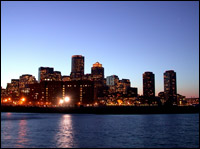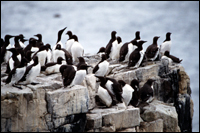oceans
-
Umbra on measuring ocean temperatures
Dear Umbra, I’ve been hearing about rising ocean temperatures more and more. My question is, what are the criteria for measuring the temperature of the ocean? Wouldn’t probe location, probe depth, water depth, prevailing current, time of day, and ambient temperature all potentially affect the result? Have the criteria remained constant for the recorded history? […]
-
Tips on seafood consumption from a seafaring wench
 Ahoy there, fellow poop-deckers! I hope the fair seas have treated ye well since me last arrrr-ticle. This one, dear mateys, will focus on grub -- that's food to you landlubbers -- specifically seafood. There's been much to-do lately on mercury advisories and the safety of sushi, so how's a seadog to know what's safe to eat, what's caught (or farmed) sustainably, and what's not?
Ahoy there, fellow poop-deckers! I hope the fair seas have treated ye well since me last arrrr-ticle. This one, dear mateys, will focus on grub -- that's food to you landlubbers -- specifically seafood. There's been much to-do lately on mercury advisories and the safety of sushi, so how's a seadog to know what's safe to eat, what's caught (or farmed) sustainably, and what's not?But before I delve into the murky waters of seafood safety, I've a message for any bilge-suckers planning to comment on this post about how "un-environmental" I am for suggesting that seafood is an acceptable food source: I'll swab the deck with you, I will. Don't tempt me. That said, let's weigh anchor.
-
Global warming could wipe out the bottom of the food chain.
 When you woke up this morning, did you thank [God, your lucky stars, the Big Bang] for plankton? If you didn't, consider adding it to your daily routine. Sure plankton are teeny-tiny and look like scary aliens, but they're also moderately important, in that sustaining-life sort of way.
When you woke up this morning, did you thank [God, your lucky stars, the Big Bang] for plankton? If you didn't, consider adding it to your daily routine. Sure plankton are teeny-tiny and look like scary aliens, but they're also moderately important, in that sustaining-life sort of way. Sadly, global warming could kill them off. The Independent wins my nomination for "Most Sinister Opening Paragraph o' the Day":
The microscopic plants that underpin all life in the oceans are likely to be destroyed by global warming, a study has found.
The article goes on to tell how this has "catastrophic implications" and is "potentially devastating," not just because the little critters are chow for bigger critters, but also because they absorb carbon dioxide in their wee bodies and take it with them when they die and sink to the ocean floor. Thanks for taking one for the team, plankton.
Of course this was entirely expected and scientists have been taking steps to resolve this imminent disaster, right? Uh, no.
Scientists had believed phytoplankton, which survives best at depths of about 100 metres, is largely stable and immune from the impact of global warming.
Whoops!
Without phytoplankton, the oceans would soon because marine deserts.
This is depressing, so I'm going to end this post with an exciting contest! Fun, fun! First person to name the band and song title of the following lyric wins a virtual high five from me!
"The ocean is a desert with its life underground, and a perfect disguise above."
Good luck!
-
Japanese fishermen slaughter their competition
All over the world people are feeling the effects of overfishing. While I would personally advocate not eating fish to begin with, others have come up with alternative solutions, from establishing sustainably managed fisheries to launching campaigns educating the public on what fish to consume.
And then there is this:
In the Japanese fishing village of Taiji, fishermen are rounding up and slaughtering hundreds and even thousands of dolphins right now.
After driving pods of dolphins into shallow coves, the fishermen kill the dolphins, slashing their throats with knives or stabbing them with spears. Thrashing about, the dolphins take as long as six minutes to die. The water turns red with their blood and the air fills with their screams.
This brutal massacre -- the largest scale dolphin kill in the world -- goes on for six months of every year. Even more shocking, the captive dolphin industry is an accomplice to the kill.Way to go fellas -- violence and murder is always the easiest solution, isn't it? Who's next after you wipe out all of your non-human competition?
If you would like to do something, One Voice, the Earth Island Institute, and the Elsa Nature Conservancy have a few options on their website.
-
U.S. leaders, residents turn backs on impending coastal chaos
Don’t let Beantown become a has-been town. Buckle your seatbelts: it’s going to be a wet ‘n’ wild ride. That’s the prediction — or, rather, the certainty — that today’s global warming carries. Erratic and unpredictable weather is en route, and coastal areas are among the places destined to be hardest hit. So why are […]
-
Niaz Dorry, oceans campaigner, answers questions
Niaz Dorry. What work do you do? I’m the cofounder of Clean Catch, a new project aimed at promoting diverse, healthy oceans by supporting the people who have historically shown themselves to be responsible stewards of the ocean — small-scale fishing communities. What does your organization do? Clean Catch works with and supports small-scale fishing […]
-
Little-known facts from a country on the edge of your consciousness
293,966 — population of Iceland3 4,117,827 — population of Kentucky2 10 — percentage of Icelanders who believe elves “definitely” exist4 0 — number of successful elf surveys conducted in Kentucky 11.5 — percentage of Iceland that is covered by glaciers1 3,240 — square miles covered by the largest glacier, Vatnajökull1 2 — tectonic plates visible […]
-
Seabirds suffer as climate change unravels North Sea food web
Guillemots are disappearing … Photo: Dr. Brian Wilson, Centre for Bioscience ImageBank. On the south side of the isle of Shetland, off the coast of Scotland, there are more than 1,200 guillemot nests. Last spring, all of them were empty. No pear-shaped eggs, no downy chicks, no next generation of guillemots. Elsewhere on Shetland, the […]
-
David Helvarg, marine activist, answers questions
David Helvarg. With what environmental organization are you affiliated? I’m president of Blue Frontier Campaign. What does your organization do? What, in a perfect world, would constitute “mission accomplished”? Blue Frontier works to strengthen America’s ocean constituency by building unity among seaweed (marine grassroots) activists at the local, regional, and national levels by providing tools […]

